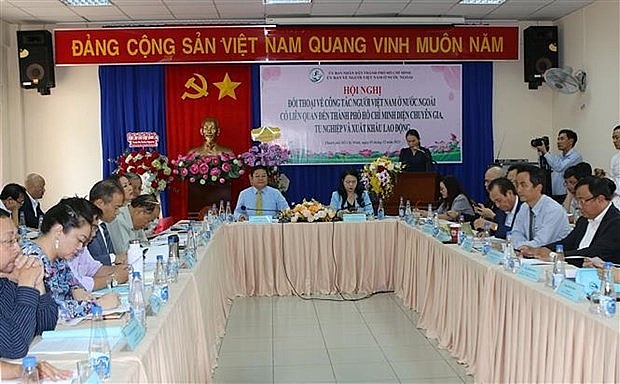Measures sought to provide comprehensive support for Vietnamese guest workers
A dialogue on overseas Vietnamese affairs and sending labourers abroad to work was jointly held by the Committee for Overseas Vietnamese Affairs and the Department of Labour, Invalids and Social Affairs of Ho Chi Minh City on December 5.
 |
| Participants at the dialogue session. (Photo: VNA) |
HCM City – A dialogue on overseas Vietnamese affairs and sending labourers abroad to work was jointly held by the Committee for Overseas Vietnamese Affairs and the Department of Labour, Invalids and Social Affairs of Ho Chi Minh City on December 5.
The event, in both in-person and online forms, offered a venue for experts and representatives from diplomatic agencies, State management bodies, businesses, and Vietnamese communities abroad to share experiences towards building a widespread and sustainable support network and mechanisms that provide better support and protection for Vietnamese people living and working abroad.Head of the municipal Committee for Overseas Vietnamese Affairs Vu Thi Huynh Mai stressed that sending labourers abroad to work has contributed to creating jobs, increasing income, speeding up poverty reduction and socio-economic development of the locality, and promoting the image and value of the country and its culture to the international community.
However, the coordination between Vietnamese diplomatic agencies abroad and domestic state management agencies responsible for the labour export work, as well as companies involved in sending workers abroad, has not proven effective, she said, adding that some organisations and businesses involved in the work fail to meet requirements.
To overcome limitations and bring more opportunities to workers and experts when participating in the foreign labour market, it is necessary to establish an effective and sustainable communication and cooperation channel between diplomatic agencies, state management agencies, organisations and businesses in managing and protecting the rights of Vietnamese labourers and experts working abroad, Mai said.
The city’s relevant agencies should learn from international experience towards improving the quality of programmes and projects to send labourers abroad, and activities related to OVs, she went on.
According to Vice Director of the municipal Labour, Invalids and Social Affairs Huynh Le Nhu Trang, employers in the traditional labour markets such as Japan, Taiwan (China), and the Republic of Korea highly value Vietnamese guest workers for their diligence and quick adaptability.
According to Dinh Vinh Cuong, Chairman of Group 365, attention should be paid to training and improving foreign language proficiency, professional skills, working style and cultural awareness for labourers; enhancing management and supervision, and support, and ensuring rights and safety for labourers when they work abroad.
HCM City needs to expand and persify the labour export market, targeting high-income markets with demand for high-quality workers, Cuong said.
Participants suggested policies for managing experts and trainees, and ensuring rights and social security for Vietnamese labourers working abroad. They also proposed solutions to improve processes for recruiting and training labourers; increase judicial support and consultation for workers; and strengthen international cooperation in this field.
What the stars mean:
★ Poor ★ ★ Promising ★★★ Good ★★★★ Very good ★★★★★ Exceptional
Related Contents
Latest News
More News
- Tet event in Japan celebrates success of 14th National Party Congress (January 25, 2026 | 10:04)
- 14th National Party Congress wraps up with success (January 25, 2026 | 09:49)
- Congratulations from VFF Central Committee's int’l partners to 14th National Party Congress (January 25, 2026 | 09:46)
- List of newly-elected members of 14th Political Bureau announced (January 23, 2026 | 16:27)
- 14th Party Central Committee unanimously elects To Lam as General Secretary (January 23, 2026 | 16:22)
- List of members of 14th Party Central Committee announced (January 23, 2026 | 09:12)
- Highlights of fourth working day of 14th National Party Congress (January 23, 2026 | 09:06)
- Press provides timely, accurate coverage of 14th National Party Congress (January 22, 2026 | 09:49)
- Press release on second working day of 14th National Party Congress (January 22, 2026 | 09:19)
- Minister sets out key directions to promote intrinsic strength of Vietnamese culture (January 22, 2026 | 09:16)

 Tag:
Tag:




















 Mobile Version
Mobile Version